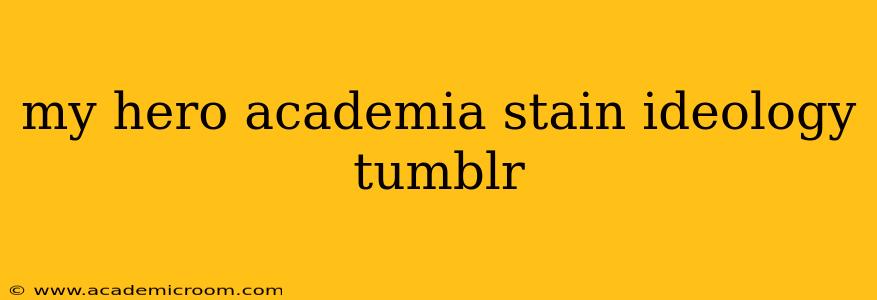The enigmatic villain Stain, from My Hero Academia, continues to fascinate fans with his complex ideology and captivating presence. His actions, while undeniably villainous, spark debate and introspection, frequently fueling lively discussions across platforms like Tumblr. This post delves into Stain's philosophy, examining its nuances and exploring the various interpretations surrounding it. We'll unpack the core tenets of his belief system and consider why he resonates so strongly with some viewers, even amidst his violent methods.
What is Stain's Ideology?
At its core, Stain's ideology revolves around a strict interpretation of heroism. He believes true heroes should act selflessly, driven solely by a desire to help others, without regard for personal gain or recognition. He vehemently opposes the "fake" heroes, those who utilize their Quirks for personal profit, fame, or societal status. Stain sees these individuals as tainting the very essence of heroism, corrupting the ideal he so fiercely champions. His definition of a "true hero" is uncompromising and starkly purist. This is where the complexities and controversial nature of his beliefs emerge.
Is Stain a Hero?
This question, a frequent topic on Tumblr, highlights the grey areas within Stain's ideology. While his methods are undeniably brutal and criminal, the underlying motivation – a desire for a purer form of heroism – resonates with some audiences. His rejection of the commercialization and self-serving aspects of hero society taps into a deep-seated cynicism many share. His actions, however horrific, aren't motivated by personal greed or malice but by a distorted, albeit extreme, sense of justice. This internal conflict is central to his character and contributes to his lasting appeal.
Why Does Stain's Ideology Resonate with Some?
Many Tumblr users point to the hypocrisy and commercialization within the hero society of My Hero Academia as a contributing factor to Stain's appeal. The series itself doesn't shy away from criticizing this system; Stain simply takes that critique to its extreme. His harsh judgment serves as a mirror reflecting societal flaws, highlighting the disconnect between idealistic notions of heroism and the often-cynical realities. This critique is a powerful tool, making Stain more than just a one-dimensional villain.
How Does Stain's Ideology Relate to Real-World Issues?
Stain's ideology can be interpreted through a real-world lens. His critique of superficial heroism draws parallels to discussions about celebrity culture, corporate greed, and the commodification of social movements. The debate around Stain's actions allows us to examine the ethical complexities of fighting for ideals, even when the methods employed are questionable. This parallels the moral dilemmas faced by many real-world activists and reformers.
What are the flaws in Stain's Ideology?
While his ideals are compelling in some ways, Stain's ideology is fundamentally flawed. His judgment is absolute and unforgiving, leaving no room for nuance or individual circumstances. His belief in righteous violence as a means to an end is morally reprehensible and utterly contradicts the very essence of true heroism. The means never justify the ends, and Stain's actions highlight the disastrous consequences of extremism.
Does Stain Believe He Is Doing Good?
Absolutely. This is a crucial point often overlooked. Stain genuinely believes he is purging society of its corrupt elements, paving the way for a purer form of heroism. His actions, while villainous from a societal perspective, stem from a deeply held, albeit misguided, belief in his own righteousness. This internal conviction adds layers to his character, making him a compelling and multifaceted antagonist.
This exploration of Stain's ideology provides a deeper understanding of this complex character and his impact on the My Hero Academia narrative. His presence continues to spark dialogue, reflecting the ongoing debate about heroism, morality, and the ethics of fighting for ideals. The complexities of Stain's character and his controversial ideology are what make him such a powerful and enduring presence within the My Hero Academia fandom, particularly on platforms like Tumblr.
